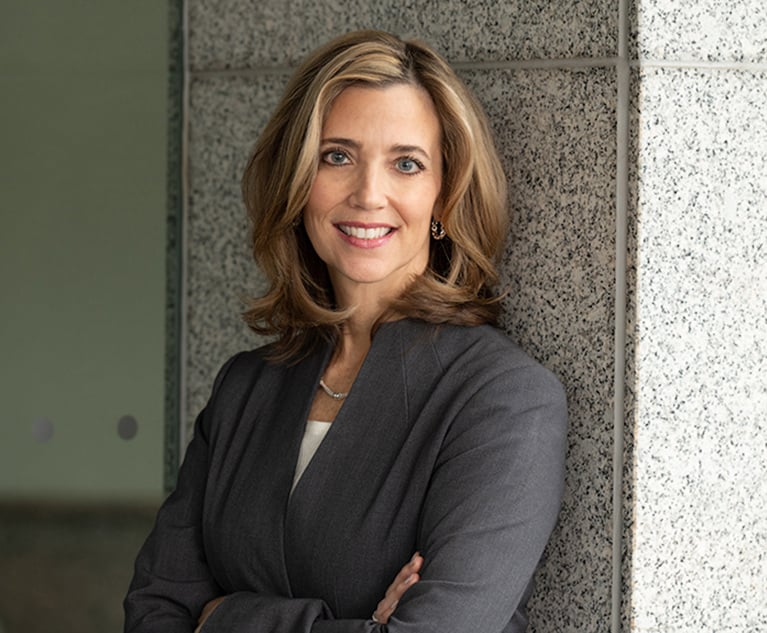 Becton Dickinson logo on the website homepage – Image by Shutterstock
Becton Dickinson logo on the website homepage – Image by ShutterstockBecton Dickinson Subsidiary Asks SCOTUS to Restrict Federal Age-Bias Claims
"The issue continues to percolate in other circuits, offering the opportunity to address it should a split later develop," Ogletree Deakins lawyers told the justices in the case, brought by a 58-year-old lawyer who was not hired for an in-house legal post.
June 28, 2019 at 11:00 AM
3 minute read
The original version of this story was published on National Law Journal
Federal age-bias protections do not extend to outside job applicants but only to employees, a healthcare company told the U.S. Supreme Court on Thursday in rebutting claims from a 58-year-old lawyer who was not hired for an in-house legal post.
The lawyer, Dale Kleber, who applied for a senior counsel position at San Diego-based CareFusion Corp., filed claims under the federal Age Discrimination in Employment Act. New Jersey-based medical technology company Becton, Dickinson and Co. is the parent of CareFusion.
A federal appeals panel in Chicago ruled in his favor last year, but a subsequent order by the full appeals court overturned the decision. Kleber's lawyers filed a petition in the Supreme Court in May.
“This break with settled law threatens to materially harm the ability of millions of current and future older workers to secure financial security and to cause significant damage to the nation's economy,” Kleber's lawyer, Laurie McCann of the AARP Foundation, told the justices.
Kleber sought a position that was advertised with a seven-year experience cap. His attorneys said more than 100 other applicants applied for the position, and CareFusion interviewed 10 of those prospective hires. The position was awarded to a 29-year-old lawyer.
CareFusion is represented in the Supreme Court by David Schenberg in St. Louis, co-chairman of the appellate practice at Ogletree, Deakins, Nash, Smoak & Stewart.
Schenberg disputed that federal appeals courts are divided over whether the Age Discrimination in Employment Act covers both job applicants and employees. “The issue continues to percolate in other circuits, offering the opportunity to address it should a split later develop,” Schenberg said in Thursday's filing.
The U.S. Court of Appeals for the Seventh Circuit, sitting en banc, said in January that the Age Discrimination in Employment Act “makes clear that Congress, while protecting employees from disparate impact age discrimination, did not extend that same protection to outside job applicants.”
The appeals court said provisions in the law protect “older employees who encounter age-based disparate impact discrimination in the workplace. And Congress, of course, remains free to do what the judiciary cannot—extend [the law] to outside job applicants, as it did in amending Title VII.”
Kleber's lawyers contend the appeals court too narrowly construed the civil rights law, “despite the statutory language and the great weight of Supreme Court precedent.” The AARP team told the Supreme Court that “the Seventh Circuit engaged in historical as well as linguistic gymnastics to justify its disregard of controlling Supreme Court precedent.”
The Supreme Court in 2017 turned down a petition that addressed similar questions about the scope of the Age Discrimination in Employment Act.
This content has been archived. It is available through our partners, LexisNexis® and Bloomberg Law.
To view this content, please continue to their sites.
Not a Lexis Subscriber?
Subscribe Now
Not a Bloomberg Law Subscriber?
Subscribe Now
NOT FOR REPRINT
© 2024 ALM Global, LLC, All Rights Reserved. Request academic re-use from www.copyright.com. All other uses, submit a request to [email protected]. For more information visit Asset & Logo Licensing.
You Might Like
View All
She May Take the Bench: Appellate Division Sides With Prosecutor in Pension Dispute
4 minute read
Indemnification of Board Member-Plaintiffs Must Be Expressly Stated, NJ Supreme Court Says
6 minute read
Letter to the Editor: Response to Recent 'Chevron' Deference Piece

New Jersey's Experience Shows That 'Chevron' Deference Not Essential to the Administrative State
7 minute readTrending Stories
- 1US Magistrate Judge Embry Kidd Confirmed to 11th Circuit
- 2Shaq Signs $11 Million Settlement to Resolve Astrals Investor Claims
- 3McCormick Consolidates Two Tesla Chancery Cases
- 4Amazon, SpaceX Press Constitutional Challenges to NLRB at 5th Circuit
- 5Schools Win Again: Social Media Fails to Strike Public Nuisance Claims
Who Got The Work
Michael G. Bongiorno, Andrew Scott Dulberg and Elizabeth E. Driscoll from Wilmer Cutler Pickering Hale and Dorr have stepped in to represent Symbotic Inc., an A.I.-enabled technology platform that focuses on increasing supply chain efficiency, and other defendants in a pending shareholder derivative lawsuit. The case, filed Oct. 2 in Massachusetts District Court by the Brown Law Firm on behalf of Stephen Austen, accuses certain officers and directors of misleading investors in regard to Symbotic's potential for margin growth by failing to disclose that the company was not equipped to timely deploy its systems or manage expenses through project delays. The case, assigned to U.S. District Judge Nathaniel M. Gorton, is 1:24-cv-12522, Austen v. Cohen et al.
Who Got The Work
Edmund Polubinski and Marie Killmond of Davis Polk & Wardwell have entered appearances for data platform software development company MongoDB and other defendants in a pending shareholder derivative lawsuit. The action, filed Oct. 7 in New York Southern District Court by the Brown Law Firm, accuses the company's directors and/or officers of falsely expressing confidence in the company’s restructuring of its sales incentive plan and downplaying the severity of decreases in its upfront commitments. The case is 1:24-cv-07594, Roy v. Ittycheria et al.
Who Got The Work
Amy O. Bruchs and Kurt F. Ellison of Michael Best & Friedrich have entered appearances for Epic Systems Corp. in a pending employment discrimination lawsuit. The suit was filed Sept. 7 in Wisconsin Western District Court by Levine Eisberner LLC and Siri & Glimstad on behalf of a project manager who claims that he was wrongfully terminated after applying for a religious exemption to the defendant's COVID-19 vaccine mandate. The case, assigned to U.S. Magistrate Judge Anita Marie Boor, is 3:24-cv-00630, Secker, Nathan v. Epic Systems Corporation.
Who Got The Work
David X. Sullivan, Thomas J. Finn and Gregory A. Hall from McCarter & English have entered appearances for Sunrun Installation Services in a pending civil rights lawsuit. The complaint was filed Sept. 4 in Connecticut District Court by attorney Robert M. Berke on behalf of former employee George Edward Steins, who was arrested and charged with employing an unregistered home improvement salesperson. The complaint alleges that had Sunrun informed the Connecticut Department of Consumer Protection that the plaintiff's employment had ended in 2017 and that he no longer held Sunrun's home improvement contractor license, he would not have been hit with charges, which were dismissed in May 2024. The case, assigned to U.S. District Judge Jeffrey A. Meyer, is 3:24-cv-01423, Steins v. Sunrun, Inc. et al.
Who Got The Work
Greenberg Traurig shareholder Joshua L. Raskin has entered an appearance for boohoo.com UK Ltd. in a pending patent infringement lawsuit. The suit, filed Sept. 3 in Texas Eastern District Court by Rozier Hardt McDonough on behalf of Alto Dynamics, asserts five patents related to an online shopping platform. The case, assigned to U.S. District Judge Rodney Gilstrap, is 2:24-cv-00719, Alto Dynamics, LLC v. boohoo.com UK Limited.
Featured Firms
Law Offices of Gary Martin Hays & Associates, P.C.
(470) 294-1674
Law Offices of Mark E. Salomone
(857) 444-6468
Smith & Hassler
(713) 739-1250






